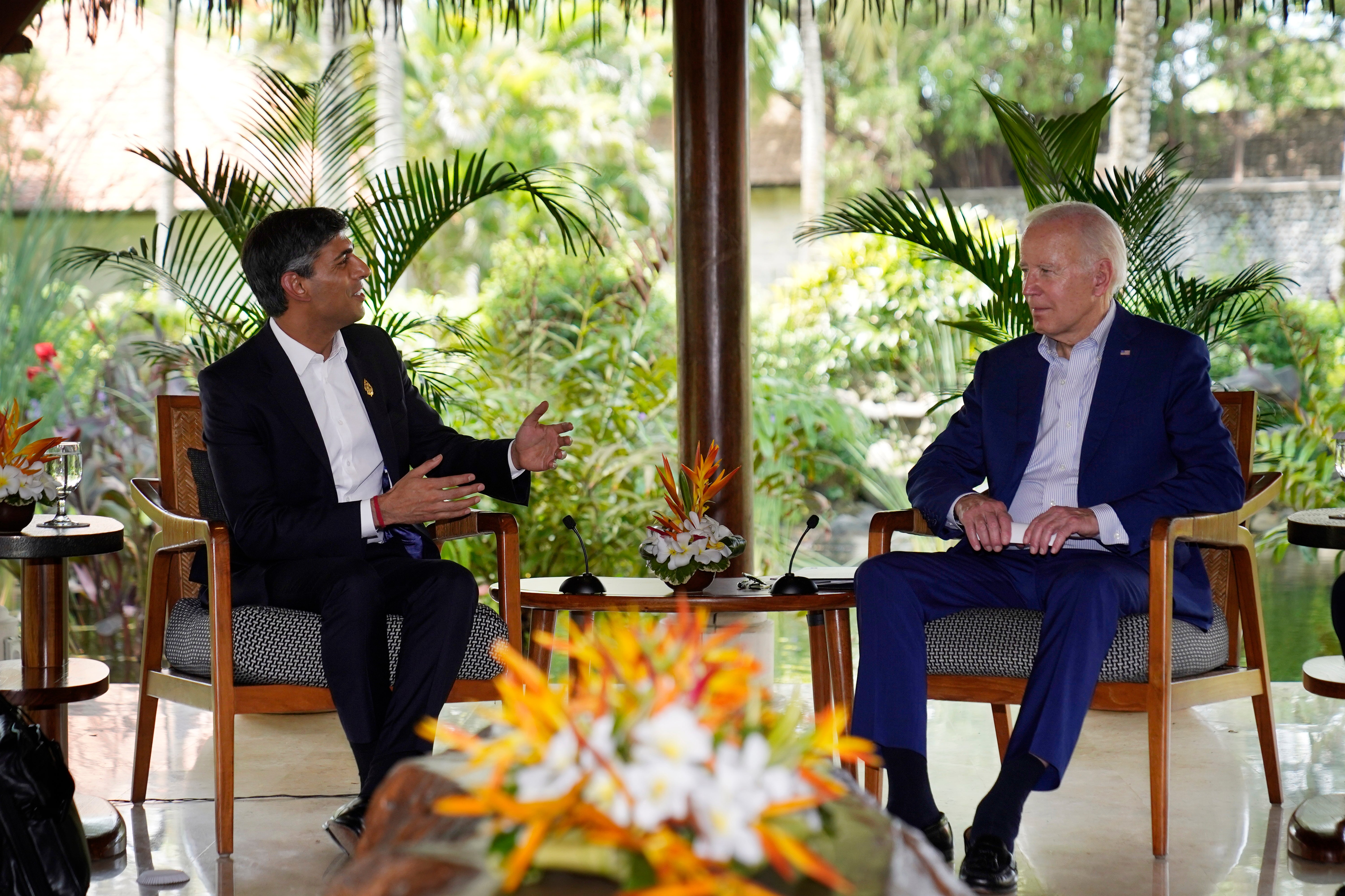Rishi Sunak is not America’s No 1 ally like I was, says Tony Blair
Former PM says that he is why he backed Iraq War - to make sure White House called No 10 first in a crisis

Your support helps us to tell the story
From reproductive rights to climate change to Big Tech, The Independent is on the ground when the story is developing. Whether it's investigating the financials of Elon Musk's pro-Trump PAC or producing our latest documentary, 'The A Word', which shines a light on the American women fighting for reproductive rights, we know how important it is to parse out the facts from the messaging.
At such a critical moment in US history, we need reporters on the ground. Your donation allows us to keep sending journalists to speak to both sides of the story.
The Independent is trusted by Americans across the entire political spectrum. And unlike many other quality news outlets, we choose not to lock Americans out of our reporting and analysis with paywalls. We believe quality journalism should be available to everyone, paid for by those who can afford it.
Your support makes all the difference.Tony Blair has criticised Rishi Sunak’s lack of influence with Joe Biden - and said he backed the Iraq War to make sure he was the first person the White House phoned in a crisis.
In an interview to mark the upcoming 20th anniversary of the conflict, the former Prime Minister admitted he turned down a last minute offer from President George Bush for British troops not to take part in the war.
He said he was ‘uncomfortable’ about British troops joining the US invasion but went ahead because our special relationship with America would have been wrecked if we had let them fight alone.
Mr Blair defended his conduct, saying that when he was in Downing St he was always the first world leader called on the White House ‘hot line.’
He doubted Mr Sunak received the same preferential treatment from Mr Biden.
Mr Blair’s comments were made on the day that Mr Sunak is in America for talks with Mr Biden on greater US-UK co-operation on defence. Mr Biden is also expected to accept an invitation from Mr Sunak to visit Northern Ireland in April to commemorate the 25th anniversary of the Good Friday Agreement.
Mr Blair told a BBC Radio 4 series on the Iraq War: ‘When I was prime minister there was no doubt under President Clinton or President Bush who the president picked up the phone to first. It was the British Prime Minister.
‘Today we are out of Europe. Would Joe Biden pick up the phone to Rishi Sunak first, I’m not sure.’
Mr Blair confirmed that on the eve of the Iraq War, with him facing a major Commons revolt, Mr Bush told him he would be content if British troops did not take part.
Asked why he rejected a ‘way out’ when Mr Bush had said ‘you don’t have to do this,’ Mr Blair replied: ‘Yes, but I was sure our alliance depended on us doing this together.
‘Don’t be under any doubt at all: if Britain had left the alliance and said “you go and do this” it would have had a significant impact on our relationship.’
Mr Bush’s Deputy National Security Adviser Stephen Hadley told the programme, ‘Shock and War,’ (corr) that Mr Bush told Mr Blair: ‘Look, Tony, it’s more important to me and the US that you stay in power than to have you at my side in an operation in Iraq, as much as I would like that.’
Mr Hadley said Mr Blair had privately promised Mr Bush as long as six months before the war that he would join the invasion.
The secret pact was made when the two leaders met at the Camp David presidential retreat in Maryland in September 2002.
Mr Hadley recalled: ‘The two of them went off by themselves for an hour or so. I recall the look of relief on his (Mr Bush’s) face and in his voice - he said “Blair has told me that if at the end of the day diplomacy does not work, and we have to go to war with Saddam, he is with me.”’
British spy chiefs thought the Americans were ‘mad’ from the outset to declare war on Iraq, according to Luis Rueda, head of the CIA’s Iraq Operations Group in 2003.
He described the shocked reaction of UK intelligence chiefs when informed in 2001 - two years before the war - that the US was determined to bring down Saddam Hussein by force.
‘At the first mention of “we’re gonna do this” you could see their eyes opening up, wheels turning, and them thinking “you’re all mad, this is not going to end well,”’ said Mr Rueda.
Mr Blair conceded he was uneasy as war loomed: ‘I was uncomfortable because I could feel all the options were closing. I tried right until the last moment to avoid military action.’
A total of 179 British service personnel died in the Iraq War.



Join our commenting forum
Join thought-provoking conversations, follow other Independent readers and see their replies
Comments